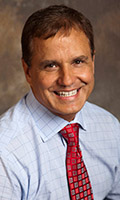It’s been many months since our Executive Director Todd Sherer completed his term as president, of the Association of University Technology Managers (AUTM), the professional association for those involved with academic technology transfer. Our industry continues to evolve rapidly, so we thought it a good time to check in, speak with him about his experience, and see if his perspective has changed with the passage of time. We interviewed Todd about his term as president and got a glimpse into what it’s like to be AUTM president. We also discussed how this experience will influence him going forward.
Here’s part two of that interview. (Find part 1 of the interview here.)

What do you consider a key accomplishment during your term?
One key accomplishment was securing a $750,000 grant from the Coulter Foundation which allowed AUTM to push forward initiatives in a way that we hadn’t been able to do previously. AUTM is a very fluid and financially sound organization, so we have money to invest in our agenda each year but not on the scale that this additional Coulter funding would allow. With the grant extending over four years it gives AUTM a chance to jump start some existing initiatives as well as launch some brand new ones and provides an ability to stretch our financial resources.
Since AUTM wasn’t expecting that to happen it was a fairly fluid process. Coulter approached me, in large part, due to our relationship through the Emory University Georgia Tech Coulter Translational Fund Program. They didn’t tell us what had to be done with the grant. Instead they asked us to articulate exactly what we would do with such a grant. Vicky Louise, our Executive Director at the time, and myself brainstormed and put together five potential projects and to our surprise the Coulter Foundation was very interested in and willing to fund all five. I feel that I had a strong role in the creation of an agenda for the Coulter funds and I wasn’t expecting that during my term as president (more details can be found at the AUTM website here).
How will your experience impact your office?
As the leader of my office I am committed to creating or fostering initiatives and not getting locked in to what we do and how we do it; we need to reinvent ourselves every so often. I look forward to working with my staff and colleagues across campus to find ways to reduce barriers, because, like it or not, it takes time to do what we do and it’s hard for a lot of our stakeholders to understand why it takes so long to get a patent issued, negotiate a license agreement, or get a product on the market.
How will being AUTM president affect you going forward?
One of the major ways that being AUTM president has impacted how I will do my work going forward at Emory is that I have a broader and more in-depth perspective on how our constituents view what we do in technology transfer. It became apparent to me in these conversations either via interviews or meetings, particularly on the hill, that there are a lot of conversations about our profession that we are not being invited to because of the perception that we are too entrenched in our own success to look beyond our own metrics and attempt to understand the role we play in the economy. With that in mind, my goal is to find a way to engage in those conversations in a less defensive manner.
We have to find a way to more pro-actively and collegially engage in those conversations. In other words, if we don’t start becoming part of a solution, then we will continue to be viewed as part of the problem and won’t be invited to the table. I think that’s very difficult for some members of our profession to understand because it’s easy to think that these people haven’t spent a day walking in our shoes so they just won’t understand. This belief is unproductive and damaging. We need to stay tried and true to a few messages, find a way to be invited to the table, and stay engaged in public policy. As professionals, even those not on the AUTM Board, we can remain engaged with our own federal relations officer and participate in shaping the story and the message through whatever medias we can, including new methods like social media.
I continue to be surprised every time someone tells me, “You guys don’t put enough effort into telling people what you do. You don’t tell them about your success, how can we know that?” It’s genuinely frustrating because we do put a lot of effort into sharing what we do, only to be told that we don’t. Personally, I will continue to stay committed to doing my part to support activities in my program to get the message out because we can’t ever afford to stop. In an information overloaded world we will continue to hear that kind of skepticism and I’m optimistic that it can be overcome.